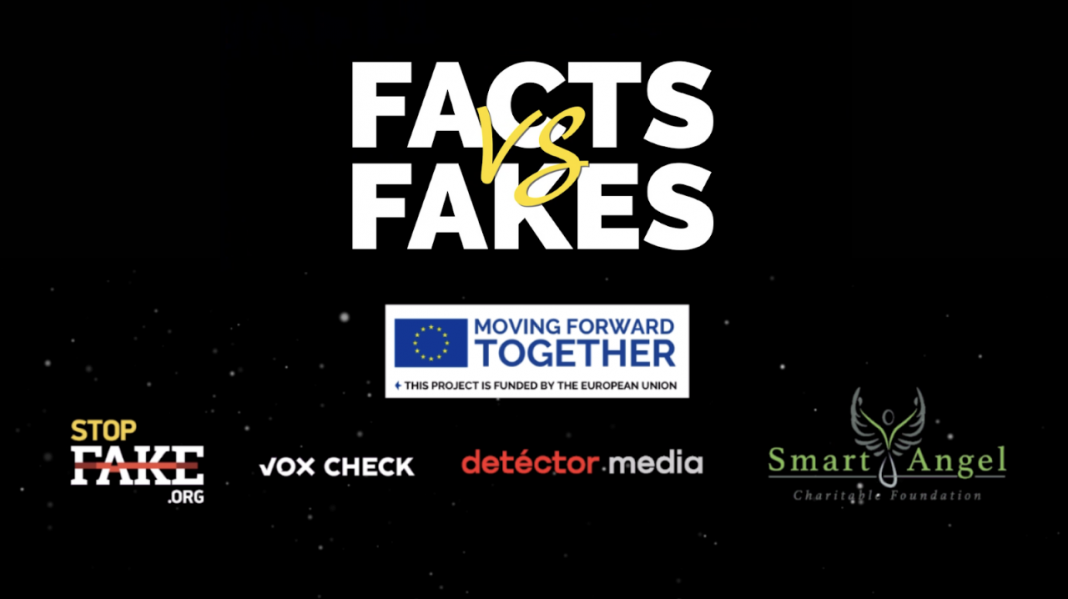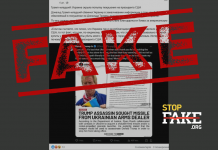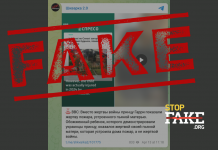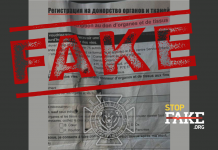Today, media literacy has become increasingly vital due to the growing influence of information technologies (including AI) and social media networks. For Ukraine, this issue is of paramount importance due to the ongoing hybrid war waged by Russia. The aggressor actively uses the media to spread disinformation and propaganda, attempting to manipulate public opinion, discredit Ukrainian state institutions, mislead about the situation on the front lines, intimidate the population, divide society through fabricated disputes and various disinformation narratives, and weaken international support for Ukraine.
According to the Debunk Disinformation analysis center, the Kremlin spent $1.9 billion on russian propaganda in 2023. Res Publica – the Centre for Civic Resilience – found that expenditures on russian state media tripled compared to 2021. Most of Russia’s efforts are directed at Russian and, undoubtedly, Ukrainian audiences.
Ukrainians must learn to distinguish between truthful and fake information, adhere to the basics of cybersecurity, and have access to reliable sources about Ukraine’s history. These are crucial aspects of national security protection. To effectively counter propaganda and disinformation, it is necessary to enhance the population’s media literacy, collaborate with international partners, develop new technological solutions, effectively use legislative media regulation, and limit the spread of fake news through social media.
Countering russian information aggression requires coordination at all levels: from the individual efforts of citizens and engaging expert organisations in combating disinformation and media to expanding outreach to international cooperation to enter the media space of European countries and beyond.
One example of such interaction is the Comprehensive Information and Awareness Campaign Against Disinformation, which ran from June 2023 to August 2024.
The campaign was carried out by the non-profit organisation Smart Angel with financial support from the European Union and in cooperation with Ukraine’s Ministry of Information Policy and Culture, Ministry of Digital Transformation, Ministry of Education and Science, Ministry of Foreign Affairs, Centre for Strategic Communications and Information Security, Centre for Countering Disinformation (under the National Security and Defence Council), and the National Police of Ukraine (Cyber Police), the Office of the President of Ukraine in the Autonomous Republic of Crimea.
Content for media products was created with the involvement of expert organisations in combating disinformation, such as Detector Media, Vox Ukraine, StopFake, the Ukrainian Institute of Media and Communication, the Centre for Democracy and Rule of Law, the National Media Literacy Project Filter, the Centre for Countering Disinformation (under the National Security and Defence Council), and others.
The main media partners were 1+1 media, Starlight Media, UATV (the International Ukrainian TV channel FREEDOM), Ukrainian Radio (Public Broadcasting), Ethnic Channels Group, Kyivstar TV, the With Ukraine project, and the Ukraine project.
Through this multidisciplinary collaboration, 32 media product formats were created for television, radio, and digital platforms, comprising 510 unique pieces of content: informational series, documentaries, educational videos and cartoons, media literacy and cybersecurity training courses, as well as an international online media literacy conference.
The primary audience was Ukraine and russian-speaking populations (via UATV/FREEDOM channel), with part of the international audience focusing on EU countries.
“This campaign is an example of successful collaboration between state institutions, civil society organisations, and international partners in the fight against disinformation. It demonstrated that only by joining forces at all levels can we effectively counter information aggression aimed at undermining our security. It is essential that the campaign reached different audiences and created conditions for further development of media literacy among the population, which is the foundation for societal resilience,” comments Ihor Solovey, Head of the Centre for Strategic Communications and Information Security.
Over 13 months, the media campaign achieved significant results:
- 224 million digital reach
- 67 million digital views
- 42 million TV reach (sum of unique viewers in the broadcast cycle)
- 96 million TV channel views.
“Over the past year, we have observed changes in information consumption trends across different resources, noted the increase in AI use to create fakes, and constantly adapted our content to new challenges posed by Russia. We realised how crucial speed is in content production — from educational materials and documentary series to sarcastic reviews, as the volume of information, the number of communication channels, and new events are constantly growing, and we need to respond quickly to ensure that new media products remain relevant,” says Daryna Kutsenko, Head of the Social Media Campaigns Project Office at Smart Angel.
Within this comprehensive media campaign, a wide range of content aimed at countering disinformation and increasing media literacy levels was created. Below are some examples of the materials available for viewing.
Regular Content: Videos and Articles on Countering Disinformation and Propaganda
Practical tips on recognising manipulation, fakes, deepfakes, fraud, and critical news consumption.
Live studio conversations with experts from fact-checking organisations and cybersecurity, sharing life hacks on media and financial literacy, and cybersecurity with viewers. Methods of information and psychological influence are explained, and the latest examples of disinformation are provided.
Weekly sarcastic videos debunking popular russian propaganda fakes in a ranking format, leading up to the most absurd disinformation.
Videos that humorously and sarcastically dissect the most popular russian narratives, fakes, and disinformation schemes designed to discredit Ukraine and spread russian propaganda.
Practical advice from Ukrainian and international experts on information hygiene and fact-checking, illustrated with contemporary propaganda materials.
Expert columns on the most relevant enemy disinformation; interviews with international experts and psychologists; as well as detailed analytical articles explaining the logic of Russian propagandists, and their key narratives — from the beginning of the armed aggression in 2014 to the large-scale war and the current confrontation with the Kremlin.
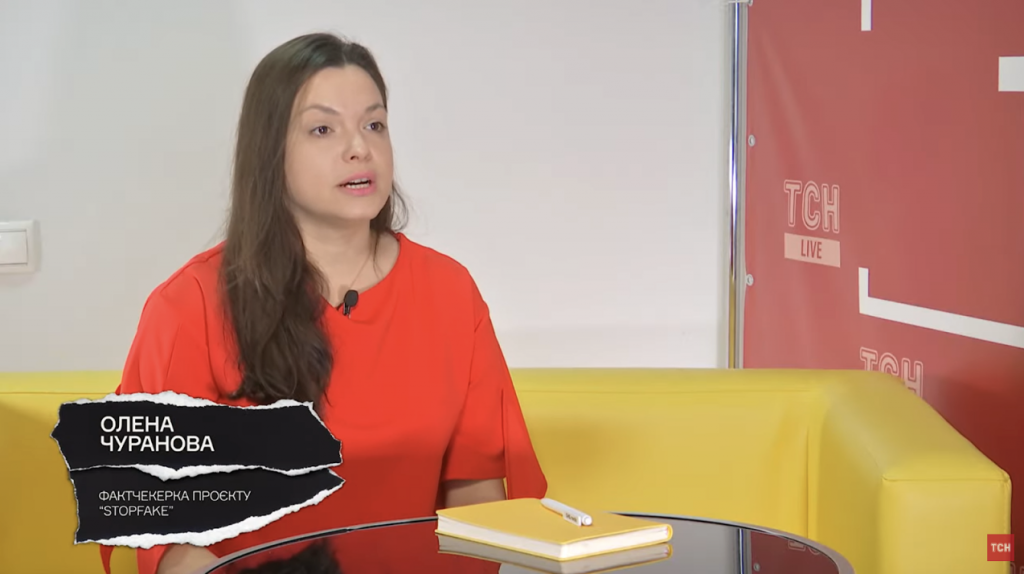
Documentary Projects
Three real stories of Ukrainian territories that russia considers its own and uses to justify the war, with an analysis of scientific archaeological and historical data involving international experts.
An investigative film about how Russia uses soft power: cultural diplomacy, various NGOs, research centers, and cultural initiatives worldwide to promote disinformation and influence policy.
A documentary chronicle for the Ukrainian audience with fresh footage, interviews with experts and eyewitnesses, tracing and explaining events from the beginning of Putin’s presidency to the current hybrid aggression.
A documentary series for the Ukrainian audience that tells about the techniques and methods of Russian propaganda. It describes the formation of the Russian media landscape, government communication with citizens, and the influence of the authoritarian regime on public consciousness.
Media Literacy and Cybersecurity Training Courses
The series covers topics such as: What is cyberspace and its components? Financial fraud: common schemes, social engineering, how not to become a victim in cyberspace: basic advice for users, personal data security, proper access and interaction with the Internet environment, passwords, conscious use of social platforms, email, types of cybercriminals, and potential consequences of their influence, Internet challenges during wartime. Information warfare. Interaction between society and state authorities.
Short explanatory videos on how to protect oneself from fakes and disinformation — 10 episodes filled with knowledge on countering fakes and disinformation, protecting personal data, and safety tips on the Internet.
A radio program about digital space security, risks and threats, traps, and criminal schemes. It also includes practical advice on avoiding and minimising them, and safely using all technical and technological digital tools and equipment to avoid falling victim to fraud or any other malicious actions.
Content for Children and Adolescents
Cartoons that introduce children to Ukrainian cities affected by the war. Five-minute episodes combine an exciting journey through time with historical facts about these cities, as well as show the current realities of destroyed cities, revealing the secrets of Mariupol, Luhansk, Kherson, Donetsk, and Crimea.
High school students learn how disinformation works and why it can be harmful, how to recognise it and hone critical thinking skills.
Content for International Audience
Periodic reviews of fakes spread in the European information space.
A series of graphic explanations about the ongoing war in Ukraine, regional geopolitical myths, and debunking Russian narratives about Ukraine’s history.
Short speeches by international and Ukrainian experts about their experience and best practices in countering propaganda and developing critical thinking skills.
Content Explaining the Formation of Russian Propaganda, the Myths It Has Created Over Decades, and the Tools It Uses
Reveals information operations aimed at sowing deep fear in society or shaping certain behaviours by referring to viral phrases and ready-made formulas launched by the enemy to justify intervention.
About the tactics of information occupation and the boundaries of propaganda used by Russia in the occupied territories of Ukraine.
Investigations/reports on the tools Russia uses to spread its propaganda (conspiracy theories, artificial intelligence, pseudo-experts, etc.).
Stories about the system of images through which Russia broadcasts and reinforces its narratives — not only among its audience to support the so-called “special operation in Ukraine” but also beyond its borders.
Reviews of major historical events that Russians have appropriated to create a cult of superiority for the Russian nation in the former Russian Empire, the Soviet Union, and modern Russia, based on facts.
Videos that explain how myths constructed by the Kremlin during the Soviet era shaped public sentiment and led to real tragedies.
More video content can be viewed via the provided link.
In the context of the information war, media literacy has become an indispensable tool for protecting national security and democratic values. Ukraine must continue implementing educational programs that raise citizens’ awareness of media, cybersecurity, and critical thinking. At the same time, cooperation with the international community remains crucial, as it helps to unite efforts in countering global disinformation.
Additional information:
Smart Angel is a non-profit organization that implements nationwide media campaigns on socially important topics in collaboration with international organizations, government bodies, NGOs, and leading media outlets in the country. Additionally, it addresses the needs of Ukrainian soldiers and defenders protecting our country.
Since October 2022, the Smart Angel team has executed 7 nationwide media campaigns, reaching over 268 million in digital coverage, 30+ million on TV, and 12 million on radio.
Key partners supporting activities in the media sector include the Delegation of the European Union to Ukraine, the U.S. Agency for International Development (USAID), the International Fund “Partnership for a Strong Ukraine,” the East Europe Foundation, the Ministry of Information Policy and Culture of Ukraine, the Ministry of Reintegration of Temporarily Occupied Territories of Ukraine, the Center for Strategic Communications and Information Security, The Centre for Countering Disinformation (under the National Security and Defence Council), the National Police of Ukraine (CyberPolice), NGO Detector Media, NGO Vox Ukraine, StopFake project, Ukrainian Institute of Media and Communication, Centre for Democracy and Rule of Law, etc.


